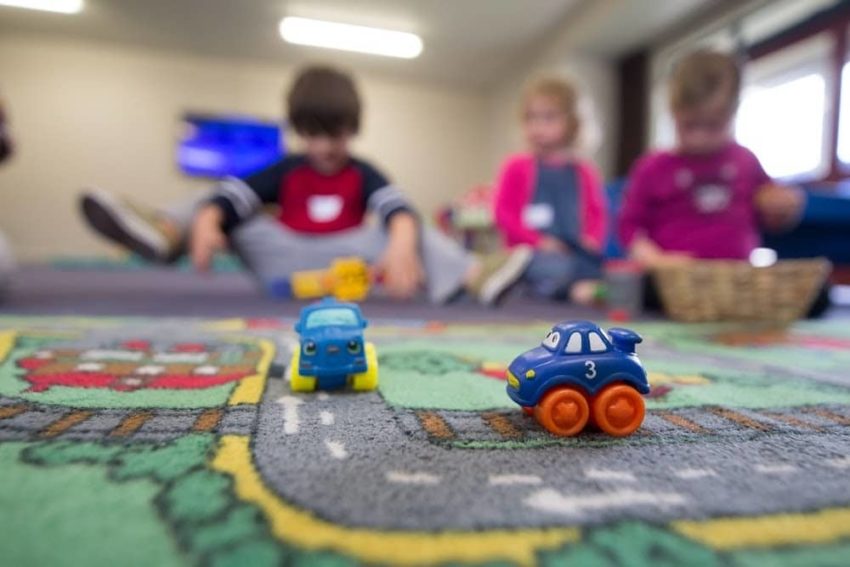What Can You Do With An Early Childhood Education Degree? Know Your Options!
Updated: June 19, 2024
Published: August 13, 2021

There are many types of roles within the early education sphere. If you’re wondering, “What can you do with an early childhood education degree?” then you’ve come to the right place. In this article, we will cover what early childhood education means, the types of coursework you can expect to take, as well as the various roles you can obtain with this specific degree.

What is Early Childhood Education?
Early childhood education (ECE) technically relates to the learning period between the ages of birth until eight years old. The type of education children receive varies based on their needs, location, and institution of choice. But, education generally will take place at a state-funded, federally-funded, or private institution.
The education received during ECE sets the foundation for all continued learning throughout one’s life. This makes it a very critical and important role for anyone entering the field of early childhood education.
Sample Courses in an Early Childhood Education Program
Programs for early childhood education all have their own respective curricula.
In an effort to provide a sampling of what you can expect to learn, here’s a look at some common course titles:
- Foundations of child development
- Organizational management
- Planning
- Dynamics of the family
- Early childhood education advocacy, research, and policy
As you can see, the degree isn’t solely focused on teaching methods. It also involves information about child development, management, and family relations.

What Can You Do with an Early Childhood Education Degree?
Once you’ve earned a degree in early childhood education, there are many positions that you can apply for.
You’ll be qualified to become a:
Preschool teacher
To become a preschool teacher, you’ll need a minimum of an associate’s degree in ECE (which typically takes two years to complete). You’ll have the option to work in a public or private school, daycare center, civic center, religious institution, or even a home. Preschool teachers are responsible for teaching the foundational and fundamental lessons that lead children to meet developmental standards. Early educators often use play as a form of teaching for this age group. Along with academic learning and standards, preschool teachers play a pivotal role in helping children develop social and emotional well-being. According to the Bureau of Labor Statistics, preschool teachers earn an average of $31,930.
Family support specialist
A family support specialist, or family support worker, aids families in need. They may work in private, public, or government agencies to provide social work services. Some of their duties include: arranging daycare, finding affordable housing, or setting up food programs. A bachelor’s degree is typically sufficient for the role, but some employers may call for a master’s degree. Social workers earn an average of $51,760 annually.
Early childhood policy consultant
Early childhood policy consultants are hired by nonprofit organizations, institutions of education, think tanks, political organizations, lobbying firms, corporate clients, and/or the government to perform a wide range of duties. Some of their responsibilities include: performing qualitative and quantitative analyses, developing funding mechanisms, creating legislation for early childhood education, and establishing policies. Based on data from Ziprecruiter, this position earns an average of $48,394.
Researcher
To become an early childhood education researcher, you’ll need to earn the terminal degree of a Ph.D. in the subject or a related subject like childhood development. As a researcher in this realm, you can find jobs at government and state agencies, nonprofit organizations, and universities who look to researchers to better understand and develop services that optimize children’s education. Researchers develop their methods of study, collect data, perform analyses, and create reports of their findings. The role may also evolve into giving presentations of their findings, writing grant proposals, publishing findings in academic journals, and being a part of scientific meetings. According to Glassdoor.com, an educational researcher earns an average salary of $85,074.
Kindergarten and elementary school teacher
A kindergarten and elementary school teacher creates lesson plans, teaches curricula, and gauges students’ progress. To become a teacher in this setting, you’ll need at least a bachelor’s degree in early childhood education. As opposed to a preschool teacher in which all the classroom time takes place in one setting, a kindergarten and elementary school teacher will deal with more physical and geographic movement. Students may have to change classrooms, learn outside, go to recess and lunch, etc. The average salary for this position is reported by Payscale.com to be $47,272.
Daycare center director
Daycare center directors manage the day-to-day operations of a daycare center. They make sure that the children and teaching staff have what they need to foster a safe, educational, and enjoyable environment. They must also make sure that the facilities are in compliance with laws and regulations. To become a daycare center director, one must have an associate’s or bachelor’s degree in early childhood education (or a related field) and be licensed. The average salary is $45,347.
Special education teacher
Special education teachers work with students who have any form of a disability, including physical, emotional, learning, or mental. To work as a special education teacher in a public institution, one must obtain a bachelor’s degree and a state-issued license or certification. In a private school, the licensure or certification may not be required. According to the BLS, the average salary is $61,420.
Earn An Education Degree Online
Once you’ve earned your bachelor’s degree in the subject, you may wish to continue your education to obtain a Master’s of Education (M.Ed). At the University of the People, you can do so online and at your own pace by enrolling in our tuition-free program. Once enrolled, students must select their specialization — either elementary/middle school education or secondary education.
Final Words
Now you have the answer to “What can you do with an early childhood education degree?” You can decide whether or not one of the aforementioned career paths are for you. The degree is a great fit for anyone who has an affinity for working with children and/or teaching.
